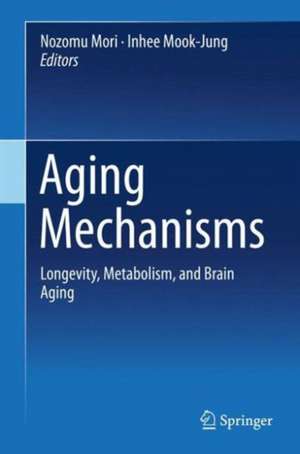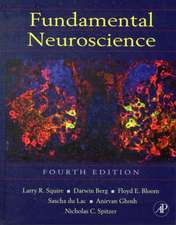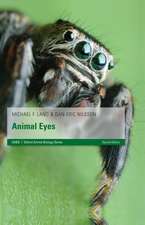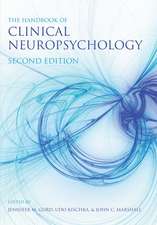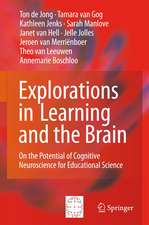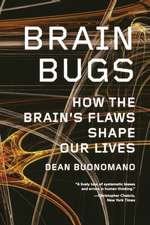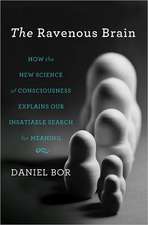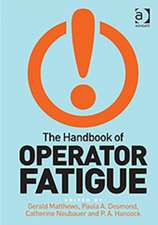Aging Mechanisms: Longevity, Metabolism, and Brain Aging
Editat de Nozomu Mori, Inhee Mook-Jungen Limba Engleză Hardback – 3 dec 2015
Why does aging exist? How do we age? How is each organism’s lifespan determined? These are fundamental questions in the field. We may be still far from achieving a complete view of aging mechanisms, but this book, Aging Mechanisms, offers an excellent opportunity to become familiar with the most updated progress in the biomedical research of aging in Japan and Korea, the two leading nations for human longevity.
| Toate formatele și edițiile | Preț | Express |
|---|---|---|
| Paperback (1) | 947.57 lei 38-44 zile | |
| Springer – 20 mar 2019 | 947.57 lei 38-44 zile | |
| Hardback (1) | 1128.57 lei 3-5 săpt. | |
| Springer – 3 dec 2015 | 1128.57 lei 3-5 săpt. |
Preț: 1128.57 lei
Preț vechi: 1376.31 lei
-18% Nou
Puncte Express: 1693
Preț estimativ în valută:
215.95€ • 226.04$ • 179.74£
215.95€ • 226.04$ • 179.74£
Carte disponibilă
Livrare economică 10-24 martie
Preluare comenzi: 021 569.72.76
Specificații
ISBN-13: 9784431557623
ISBN-10: 4431557628
Pagini: 439
Ilustrații: XIV, 439 p. 85 illus., 63 illus. in color.
Dimensiuni: 155 x 235 x 25 mm
Greutate: 1.01 kg
Ediția:1st ed. 2015
Editura: Springer
Colecția Springer
Locul publicării:Tokyo, Japan
ISBN-10: 4431557628
Pagini: 439
Ilustrații: XIV, 439 p. 85 illus., 63 illus. in color.
Dimensiuni: 155 x 235 x 25 mm
Greutate: 1.01 kg
Ediția:1st ed. 2015
Editura: Springer
Colecția Springer
Locul publicării:Tokyo, Japan
Public țintă
ResearchCuprins
Preface.- Part I From Hypotheses to Mechanisms.- Part II Human Longevity: Centenarianism and Progeria.- Part III Stem Cells, Cultured Neurons, and Lower Animal Models.- Part IV Metabolism: Factors Affecting Tissue Aging.- Part V Aging Brain: Adult Neurogenesis, Synaptic Plasticity, and Brain Volume.- Part VI Aged Brain: Mechanisms of Neurodegeneration.- Part VII Anti-Brain Aging: Neuroprotection and Therapeutic Approaches.- Epilogue.- Appendix.- Index.
Recenzii
“This text discusses the molecular and cellularaspects of the aging process in C elegans and in mammals. … The audience isprimarily those interested in the cell biology of cancer and aging. Students inmolecular and cell biochemistry would be interested in this reference.” (JosephJ. Grenier, Amazon.com, December, 2015)
Textul de pe ultima copertă
This book brings together the most up-to-date information on recent research results of leading laboratories on aging science in East Asia, particularly in Japan, Korea, and Hong Kong. Starting with a comprehensive overview of various hypotheses on biological mechanisms of aging by Dr. Sataro Goto, each chapter covers broad aspects of the most recent findings in aging-related topics: centenarian studies and genome analysis of progeria, metabolic biochemistry and neurobiology, longevity controls in yeast and nematodes, oxidative stress and calorie restriction, and neurodegeneration mechanisms in Alzheimer’s and Huntington’s diseases, with further potential therapeutic approaches to these age-related neurodegenerative diseases. Also included, in part, is a summary and the outcomes of a scientific discussion forum called the Asian Aging Core for Longevity (AACL) that has been held annually alternating between Japan and Korea during the last decade. This book can serve as a useful resource for finding appropriate collaborators in the areas it covers. The target readership is made up of graduate students and researchers at universities, medical and/or life-science schools, and biomedical and pharmaceutical institutes.
Why does aging exist? How do we age? How is each organism’s lifespan determined? These are fundamental questions in the field. We may be still far from achieving a complete view of aging mechanisms, but this book, Aging Mechanisms, offers an excellent opportunity to become familiar with the most updated progress in the biomedical research of aging in Japan and Korea, the two leading nations for human longevity.
Why does aging exist? How do we age? How is each organism’s lifespan determined? These are fundamental questions in the field. We may be still far from achieving a complete view of aging mechanisms, but this book, Aging Mechanisms, offers an excellent opportunity to become familiar with the most updated progress in the biomedical research of aging in Japan and Korea, the two leading nations for human longevity.
Caracteristici
Contains the most recent research results from leading laboratories on aging in East Asia
Discusses aging mechanisms on the basis of a wide variety of topics at the molecular and cellular levels
Includes a special chapter providing a comprehensive historical overview of biological mechanisms of aging
Discusses aging mechanisms on the basis of a wide variety of topics at the molecular and cellular levels
Includes a special chapter providing a comprehensive historical overview of biological mechanisms of aging
